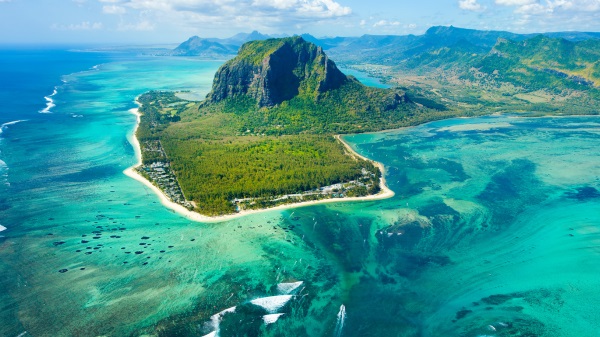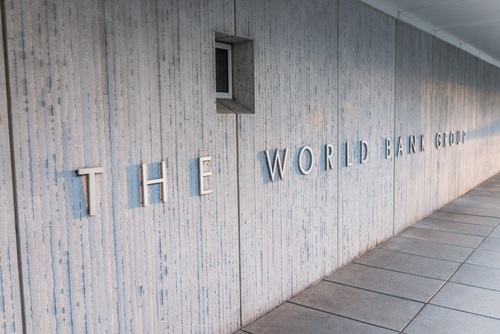Environment
Rising Seas Not Resulting in Disappearing Islands

From Heartland Daily News
A spate of recent articles acknowledges a fact that Climate Realism has long discussed. Most island nations, rather than sinking beneath the waves as seas rise amid modest warming, as predicted by climate alarmists and island profiteers, are, in fact growing.
Writing for The Pipeline, Buck Throckmorton thoroughly debunks claims that recent collapses of houses built on the shores of barrier islands in North Carolina were caused by climate change:
[B]arrier islands … are impermanent deposits of sand, which reshape, move, merge, appear, and disappear due to tides, winds, and storms.
The movement of barrier islands is not due to rising sea levels, it is due to a naturally occurring force called “longshore drift.” Where there are man-made efforts to stabilize barrier islands with jetties and sea walls, this produces other impacts on currents that cause erosion in some waterfront areas and new sand deposits in others. Beach houses in the Outer Banks are not being lost due to rising sea levels, they are being lost due to shifting sands.
Throckmorton also pointed to the disappearance of Tucker’s Island, off the coast of New Jersey, which completely disappeared due to “long-shore drift,” not rising seas.
NOAA describes the impact of long-shore drift, thusly:
Longshore drift may also create or destroy entire barrier islands along a shoreline. A barrier island is a long offshore deposit of sand situated parallel to the coast. As longshore drifts deposit, remove, and redeposit sand, barrier islands constantly change.
Semi-permanent, shifting barrier islands are not the only types of islands not being destroyed by climate change-induced rising seas. Even The New York Times (NYT) was recently forced by reality to admit that coral atolls, long the poster child of rising seas claiming nations, have been expanding and adding land amidst the Earth’s slight recent warming.
As recently as April 2024, with a story titled “Why Time Is Running Out Across the Maldives’ Lovely Little Islands,“ the NYT was still pushing the lie that rising seas threaten dozens of island nations, consisting of hundreds of small coral atolls, with extinction. Reality forced the NYT to reverse itself in the space of just three months. The author of a late June article, “A Surprising Climate Find,” wrote:
Of late, though, scientists have begun telling a surprising new story about these islands. By comparing mid-20th century aerial photos with recent satellite images, they’ve been able to see how the islands have evolved over time. What they found is startling: Even though sea levels have risen, many islands haven’t shrunk. Most, in fact, have been stable. Some have even grown.
The problem with this narrative is that the fact of growing islands during the recent period of climate change is not new news. In fact, as my colleague Linnea Lueken noted in a recent piece, the study the NYT references was published in 2018, six years ago. It found 89 percent of islands in the Pacific and Indian Oceans increased in area or were stable, and only 11 percent showed any sign of contracting.
Indeed, geological understanding of coral atoll growth and demise is not newly discovered.
“Scientists have known for decades, if not more than a hundred years, that atoll islands uniquely change with changing sea levels,” Lueken points out. “Charles Darwin was the first to propose that reefs were many thousands of feet thick, and grow upwards towards the light. He was partially correct, though reality is more complicated than his theory.”
Repeated studies show that what is true of the Maldives, growth amid rising seas, is equally true of the islands that make up Tuvalu and Kiribati, and across the island chains of Micronesia. One well-cited study from 2015 reported that 40 percent of islands in the Pacific and Indian Oceans were stable, and another 40 percent had grown, in recent decades.
Oceans, oceans everywhere, and nowhere can be found the much-bemoaned decline in island nations hyped be climate hucksters with regularity. When even the NYT is forced to admit this truth, you know the climate alarm narrative is in trouble.
Sources: The Pipeline; The New York Times; Climate Realism
Environment
Climate Scientists declare the climate “emergency” is over

The Chamber of Deputies, Prague, Czechia
News release from the Climate Intelligence Group (Clintel)
Climate scientists have issued a shock declaration that the “climate emergency” is over.
A two-day climate conference in Prague, organized by the Czech division of the international Climate Intelligence Group (Clintel), which took place on November 12-13 in the Chamber of Deputies of the Czech Republic in Prague, “declares and affirms that the imagined and imaginary ‘climate emergency’ is at an end”.
The communiqué, drafted by the eminent scientists and researchers who spoke at the conference, makes clear that for several decades climate scientists have systematically exaggerated the influence of CO2 on global temperature.
The high-level scientific conference also declared:
“The Intergovernmental Panel on Climate Change, which excludes participants and published papers disagreeing with its narrative, fails to comply with its own error-reporting protocol and draws conclusions some of which are dishonest, should be forthwith dismantled.”
The declaration supports the conclusions of the major Clintel report The Frozen Climate Views of the IPCC [presented to the Conference by Marcel Crok, Clintel’s co-founder].
Moreover, the scientists at the conference declared that even if all nations moved straight to net zero emissions, by the 2050 target date the world would be only about 0.1 C cooler than with no emissions reduction.
So far, the attempts to mitigate climate change by international agreements such as the Paris Agreement have made no difference to our influence on climate, since nations such as Russia and China, India and Pakistan continue greatly to expand their combustion of coal, oil and gas.
The cost of achieving that 0.1 C reduction in global warming would be $2 quadrillion, equivalent to 20 years’ worldwide gross domestic product.
Finally, the conference “calls upon the entire scientific community to cease and desist from its persecution of scientists and researchers who disagree with the current official narrative on climate change and instead to encourage once again the long and noble tradition of free, open and uncensored scientific research, investigation, publication and discussion”.
The full text of the communiqué follows:
The International Scientific Conference of the Climate Intelligence Group (Clintel), in the Chamber of Deputies of the Czech Republic in Prague assembled on the Twelfth and Thirteenth Days of November 2024, has resolved and now declares as follows, that is to say –
- The modest increase in the atmospheric concentration of carbon dioxide that has taken place since the end of the Little Ice Age has been net-beneficial to humanity.
- Foreseeable future increases in greenhouse gases in the air will probably also prove net-beneficial.
- The rate and amplitude of global warming have been and will continue to be appreciably less than climate scientists have long predicted.
- The Sun, and not greenhouse gases, has contributed and will continue to contribute the overwhelming majority of global temperature.
- Geological evidence compellingly suggests that the rate and amplitude of global warming during the industrial era are neither unprecedented nor unusual.
- Climate models are inherently incapable of telling us anything about how much global warming there will be or about whether or to what extent the warming has a natural or anthropogenic cause.
- Global warming will likely continue to be slow, small, harmless and net-beneficial.
- There is broad agreement among the scientific community that extreme weather events have not increased in frequency, intensity or duration and are in future unlikely to do so.
- Though global population has increased fourfold over the past century, annually averaged deaths attributable to any climate-related or weather-related event have declined by 99%.
- Global climate-related financial losses, expressed as a percentage of global annual gross domestic product, have declined and continue to decline notwithstanding the increase in built infrastructure in harm’s way.
- Despite trillions of dollars spent chiefly in Western countries on emissions abatement, global temperature has continued to rise since 1990.
- Even if all nations, rather than chiefly western nations, were to move directly and together from the current trajectory to net zero emissions by the official target year of 2050, the global warming prevented by that year would be no more than 0.05 to 0.1 Celsius.
- If the Czech Republic, the host of this conference, were to move directly to net zero emissions by 2050, it would prevent only 1/4000 of a degree of warming by that target date.
- Based pro rata on the estimate by the UK national grid authority that preparing the grid for net zero would cost $3.8 trillion (the only such estimate that is properly-costed), and on the fact that the grid accounts for 25% of UK emissions, and that UK emissions account for 0.8% of global emissions, the global cost of attaining net zero would approach $2 quadrillion, equivalent to 20 years’ global annual GDP.
- On any grid where the installed nameplate capacity of wind and solar power exceeds the mean demand on that grid, adding any further wind or solar power will barely reduce grid CO2 emissions but will greatly increase the cost of electricity and yet will reduce the revenues earned by both new and existing wind and solar generators.
- The resources of techno-metals required to achieve global net zero emissions are entirely insufficient even for one 15-year generation of net zero infrastructure, so that net zero is in practice unattainable.
- Since wind and solar power are costly, intermittent and more environmentally destructive per TWh generated than any other energy source, governments should cease to subsidize or to prioritize them, and should instead expand coal, gas and, above, all nuclear generation.
- The Intergovernmental Panel on Climate Change, which excludes participants and published papers disagreeing with its narrative, fails to comply with its own error-reporting protocol and draws conclusions some of which are dishonest, should be forthwith dismantled.
Therefore, this conference hereby declares and affirms that the imagined and imaginary “climate emergency” is at an end.
This conference calls upon the entire scientific community to cease and desist from its persecution of scientists and researchers who disagree with the current official narrative on climate change and instead to encourage once again the long and noble tradition of free, open and uncensored scientific research, investigation, publication and discussion.
Given under our signs manual this Thirteenth Day of November in the Year of our Lord Two Thousand and Twenty-Four.
Pavel Kalenda, Czech Republic [Conference Chairman]
Guus Berkhout, The Netherlands [Co-founder, Clintel]
Marcel Crok, The Netherlands [Co-founder, Clintel]
Lord Monckton, United Kingdom
Valentina Zharkova, United Kingdom
Milan Šálek, Czech Republic
Václav Procházka, Czech Republic
Gregory Wrightstone, United States (see below)
Jan Pokorný, Czech Republic
Szarka László, Hungary
James Croll, United Kingdom
Tomas Furst, Czech Republic
Gerald Ratzer, Canada
Douglas Pollock, Chile
Henri Masson, Belgium
Miroslav Žáček, Czech Republic
Jan-Erik Solheim, Norway
Video below from interview with Gregory Wrightstone.
Better to turn around halfway, than to get lost completely

Not climate change but climate policy is the main threat for the prosperity of western societies at this moment. The Clintel Foundation has stated, with a global network of 2000 scientists and experts, that there is no climate emergency. Western leaders, however, have all voted in favour of Net Zero targets for 2050, which will have a disastrous effect on our economy and therefore our prosperity. Meanwhile, the UN is increasing its effort to fight ‘disinformation’, which in practice means less open debate and more censoring of alternative views.
Climate policies are a threat for entrepreneurs and it enters deeper and deeper into the private life of citizens. Wind turbines of close to 300 meters in height industrialise our countrysides, harming the environment,, biodiversity and public health. House owners are forced to replace their gas heaters by costly heat pumps, leading to rising energy bills. More and more cities reduce speed limits to 30 kms per hour.
There is no support base among the population for all these costly measures but our political leaders so far ignore these objections. Sooner or later the tide will turn, because these policies are unfeasible and unaffordable. Clintel wants to speed up this process by making both citizens and political leaders aware of all the pitfalls. Clintel receives no funding from the government nor from the Postcode Lottery or the industry. We therefore ask citizens and small businesses to support us in our mission.
Your support will be used to:
* Explain in all details there is no climate emergency. No one should be afraid of climate change. We use our websites and social media channels to spread this information and also give interviews in the media.
* Analyse and criticize IPCC reports. We check them for alarmism and one-sidedness. In 2023 we published the book The Frozen Climate Views of the IPCC. We confront the IPCC with our results and will force them to respond to our criticism.
* Raise awareness for the negative side-effects of the current climate policies, both in terms of cost and impact on humans and the environment.
* Intervene in high profile climate court cases such as the one between Friends of the Earth and Shell in The Netherlands. Climate policy should be discussed in Parliaments, not in the courts.
If you share our views, please consider to support us through a (monthly) donation or by becoming Friend of Clintel.
Business
Up to $41 billion in World Bank climate finance unaccounted for, Oxfam finds

News release from Oxfam International
Up to $41 billion in World Bank climate finance —nearly 40 percent of all climate funds disbursed by the Bank over the past seven years— is unaccounted for due to poor record-keeping practices, reveals a new Oxfam report.
An Oxfam audit of the World Bank’s 2017-2023 climate finance portfolio found that between $24 billion and $41 billion in climate finance went unaccounted for between the time projects were approved and when they closed.
There is no clear public record showing where this money went or how it was used, which makes any assessment of its impacts impossible. It also remains unclear whether these funds were even spent on climate-related initiatives intended to help low- and middle-income countries protect people from the impacts of the climate crisis and invest in clean energy.
“The Bank is quick to brag about its climate finance billions —but these numbers are based on what it plans to spend, not on what it actually spends once a project gets rolling,” said Kate Donald, Head of Oxfam International’s Washington D.C. Office. “This is like asking your doctor to assess your diet only by looking at your grocery list, without ever checking what actually ends up in your fridge.”
The Bank is the largest multilateral provider of climate finance, accounting for 52 percent of the total flow from all multilateral development banks combined.
The issue of climate finance will take center stage at this year’s COP in Azerbaijan, where countries are set to negotiate a new global climate finance goal, the New Collective Quantified Goal (NCQG). Climate activists are demanding the Global North provide at least $5 trillion a year in public finance to the Global South “as a down payment towards their climate debt” to the countries, people and communities of the Global South who are the least responsible for climate breakdown but are the most affected. Oxfam warns that the lack of traceable spending could undermine trust in global climate finance efforts at this critical juncture.
“Climate finance is scarce, and yes, we know it’s hard to deliver. But not tracking how or where the money actually gets spent? That’s not just some bureaucratic oversight —it’s a fundamental breach of trust that risks derailing the progress we need to make at COP this year. The Bank needs to act like our future depends on tackling the climate crisis, because it does,” said Donald.
Oxfam’s investigation revealed that obtaining even basic information on how the World Bank is using climate finance was painstaking and difficult.
“We had to sift through layers of complex and incomplete reports, and even then, the data was full of gaps and inconsistencies. The fact that this information is so hard to access and understand is alarming —it shouldn’t take a team of professional researchers to figure out how billions of dollars meant for climate action are being spent. This should be transparent and accessible to everyone, most importantly communities who are meant to benefit from climate finance,” said Donald.
Notes to editors
Download Oxfam’s new report “Climate Finance Unchecked.”
-

 Brownstone Institute1 day ago
Brownstone Institute1 day agoThe Most Devastating Report So Far
-

 Economy2 days ago
Economy2 days agoCOP 29 leaders demand over a $1 trillion a year in climate reparations from ‘wealthy’ nations. They don’t deserve a nickel.
-

 Censorship Industrial Complex1 day ago
Censorship Industrial Complex1 day agoAnother Mass Grave?
-

 ESG11 hours ago
ESG11 hours agoCan’t afford Rent? Groceries for your kids? Trudeau says suck it up and pay the tax!
-

 Alberta1 day ago
Alberta1 day agoMAiD In Alberta: Province surveying Albertans about assisted suicide policies
-

 Energy1 day ago
Energy1 day agoOttawa’s proposed emission cap lacks any solid scientific or economic rationale
-

 Alberta1 day ago
Alberta1 day agoOn gender, Alberta is following the science
-

 International12 hours ago
International12 hours agoElon Musk praises families on X: ‘We should teach fear of childlessness,’ not pregnancy



